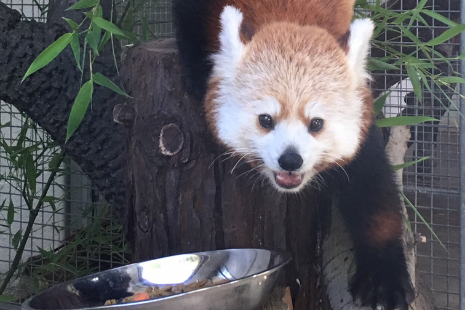
- VisitSupport Happy HollowDONATE TODAYExploreSupport Happy HollowDONATE TODAYLearnSupport Happy HollowDONATE TODAYSupportToday’s Hours: CLOSED
Happy Hollow Blog
Red panda conservation at Happy Hollow
June 19, 2019

Red pandas at Happy Hollow

Have you spotted a new adorable face in Happy Hollow’s red panda exhibit? Say hello to Xena, an 11-month-old red panda who recently relocated from Scovill Zoo in Decatur, Ill. Xena’s transfer to Happy Hollow is part of the red panda Species Survival Plan — based on their temperaments she was recommended as a (non-breeding) companion for our male panda, Will.
Xena is a curious creature who seems to enjoy checking out new things. She gets fed twice a day, and is visibly excited when zookeepers bring in fresh bamboo — her favorite! She has been exploring her new (off-exhibit) outdoor space, known by staff as the “Zen Garden,” which is located adjacent to the public exhibit. She has already chosen her favorite spot to nap – in the top of the tree.
Will and Xena are being introduced gradually, and the animal care team will give them as much time as they need to get used to each other before they will be seen on exhibit together.
Xena’s transfer followed the departure of Happy Hollow’s female red panda, Gaila, who was sent to another accredited facility in Chicago on an SSP program recommendation. Although Gaila arrived at her destination safely, she unfortunately passed away suddenly during her second week in quarantine. Quarantine is an important cornerstone of the veterinary program for all zoos, and serves as the primary defense against diseases that could be introduced with the arrival of new animals. During quarantine (which can last 30 to 90 days depending on the species) the animals are monitored closely for any signs of illness that could be passed to other animals in the collection.
Before a decision is made to move an animal to or from a facility, careful examination of veterinary records takes place, transportation methods are explored, the needs of the individual animal (as well as the species in general are thoroughly considered) and quality of life considerations are made.
Gaila received a full physical exam to ensure that she was healthy enough to travel. This included ultrasound and blood samples, and was done under anesthesia to minimize stress. At the time of her exam, Gaila appeared to be in good health.
Further test results indicate her passing was likely due to Atypical Addison’s disease, a long-term endocrine disorder which can lead to sudden death of these delicate creatures, even with treatment and close monitoring.
This was certainly an enormous loss for the SSP and for all who came to know her in her three years as a resident at Happy Hollow. Gaila’s test results will contribute to a case study that will help the zoo and veterinary community further understand this perplexing disease. Although it was not the outcome we had hoped for Gaila, Happy Hollow is proud to continue participating in saving animals from extinction through the red panda SSP program.

Supporting species in the wild
Every ticket and membership sold to Happy Hollow Park & Zoo contributes to local and global wildlife conservation. In 2018, Happy Hollow supported red panda conservation
with donations to Red Panda Network that totaled over $30,000. You can check out their recent article about Happy Hollow’s partnership with Red Panda Network and the Happy Hollow red panda exhibit that opened in 2016.
Since 1989, Happy Hollow Park & Zoo contributes data on animal fertility and survival rates to the Zoological Information Management System, an international database maintained by Species360. Incorporating ZIMS data boosted the Species Knowledge Index eightfold for comprehensive life table information used to assess populations, providing crucial information for conservation biology.
As an Association of Zoos and Aquariums accredited facility for over 25 years, Happy Hollow participates in many animal-related programs, including Species Survival Plan programs.
Approximately one-quarter of the species found at Happy Hollow are part of SSP programs, and recommendations are always made with the best interest of the species the individual animal in mind. The program is highly regulated, with several levels of oversight and coordination with AZA and SSP coordinators.
SSP programs are paramount in securing the longevity of animal species around the world, especially for those recognized as Vulnerable, Endangered or Critically Endangered under the Endangered Species Act.